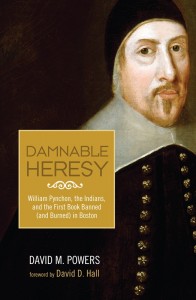William Pynchon was a native of Writtle and resident of Springfield (both near Chelmsford), who played a key role in creating and developing colonial Massachusetts. The first place named Springfield in America was founded by Pynchon in 1636 as Agawam Plantation, and in 1651 it was renamed after his Essex hometown.
We have two good reasons to talk about William Pynchon just at the moment (on top of the fact that he’s an interesting man to talk about at any time); our trip to Boston next week, and a talk here at ERO in September from an American scholar and expert on Pynchon’s life.
 David M. Powers is a native of Springfield, Massachusetts, and a graduate of Carleton College and Harvard University. His book, Damnable Heresy: William Pynchon, the Indians, and the First Book Banned and Burned in Boston, offers the first comprehensive biography of Pynchon. Placing Pynchon within the fabric of his times, Powers traces his life from Chelmsford, through his New England adventures, to his return to Britain, and describes contributions Pynchon made to the Puritan experience in Old England and New.
David M. Powers is a native of Springfield, Massachusetts, and a graduate of Carleton College and Harvard University. His book, Damnable Heresy: William Pynchon, the Indians, and the First Book Banned and Burned in Boston, offers the first comprehensive biography of Pynchon. Placing Pynchon within the fabric of his times, Powers traces his life from Chelmsford, through his New England adventures, to his return to Britain, and describes contributions Pynchon made to the Puritan experience in Old England and New.
David says:
‘Two things stand out in Pynchon’s pioneering life:
First, he consistently treated his trading partners, the Indians, with respect and sensitivity – an attitude which was regrettably not shared by many of his fellow colonists.
Second, even though he was a layman, Pynchon wrote a volume of Christian theology, The Meritorious Price of Our Redemption (1650), which the Massachusetts Bay government condemned “to be burned in the market place, at Boston, by the common executioner.” This was the first instance of book burning in British North America.’
Pynchon travelled to America with his wife and three daughters on one of the ships of the Winthrop Fleet. This was a fleet of 11 ships under the command of John Winthrop, which carried about 700 people along with livestock and provisions to New England in summer 1630.
He was a shrewd businessman, and became one of the wealthiest and most influential men in the Massachusetts Bay Colony. He initially settled in Roxbury, near Boston, but in 1635 led a settlement expedition into the Connecticut River Valley, and founded what would become Springfield. Although the land was not the best for farming, the location was a good one for him to carry on his fur trading, as it was near beaver colonies and his trading partners, the Native peoples, and was on a major transportation route, the Connecticut River.
His book, The Meritorious Price of Our Redemption, presented his views on the Atonement. Published in London, it was condemned and symbolically burned by the Bay Colony legislature because of their concern for how the English Parliament might react to strange ideas from New England. Only nine copies are known to survive.
Pynchon transferred his properties to his son John, who continued and extended the Pynchon influence in the Connecticut River Valley, and returned to England in 1652, where he spent the rest of his life.
____________________________________________________________________
Find out about our trip to Boston and more Essex-US connections here.
David will be speaking for the September meeting of the Essex History Group on the life of William Pynchon. All are welcome, admission is £1 including a cup of tea or coffee and a biscuit.
William Pynchon: From Springfield, Essex, to Springfield, Massachusetts
A talk by David M. Powers
Tuesday 1 September, 10.30am
£1 admission, no need to book
